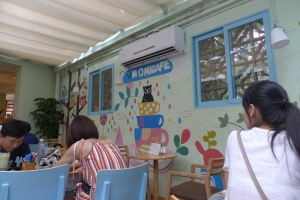By Fabienne King, Teacher in Suzhou (2015-2016)
It didn’t seem long to me at all before my plans to teach in China were turning into an exciting reality. With my suitcase packed and visa in my passport it was time to wave goodbye to my friends and family and head to the airport with the rest of the dawn commuters.
How much you call home during your time in China is a personal matter, perhaps you like to call home every day, week or blue moon, but regardless of frequency, it is a memorable experience which you will likely want to share with those you leave behind. Maintaining contact across a 7-8 hour time zone is certainly challenging at times, but friends, family and loved ones back at home remain a crucial support network and source of companionship despite the distance. If things get difficult it is still possible to call your best friend, and having spent my time in China in a long distance relationship with my boyfriend in Edinburgh – here is my advice for keeping in touch with people back in Europe and surviving the Long Distance Relationship (LDR).
The practicalities – How can I keep in touch?
First things first, as you may or may not know already, the Chinese government blocks many websites including most Western social media. While many of us get sick of scrolling down our news-feeds and may welcome the social-media abyss of China, having a good VPN is your first point of call. Many sites such as Facebook, Google (including Gmail), Instagram and Twitter are blocked in China and in order to continue using these you will need a VPN. A VPN (Virtual Private Network), re-routes your IP address to allow access to these otherwise inaccessible sites. With a VPN you can use Facebook-messenger as before, share pictures, YouTube videos and generally record interesting experiences. It is better to get a VPN while you are still in the UK, as although not impossible, they are harder to acquire once in China. They are normally not so expensive and free VPN’s are also available and reported as being successful. This will allow you to continue using social media and remain updated should you choose to within your existing networks.
HOWEVER, it is also worth having alternative China-friendly means of communication, should your VPN go down within your time abroad. Make sure you set up an email address with another provider to Gmail if this is your preferred account and be prepared to occasionally go radio silent on all things VPN. While I advise going local on many websites anyway, (music 163 is like a free Chinese Spotify!), getting a VPN is a good way of keeping in touch with the Western world as well as its people.
Skype is another great way to keep in touch and allows you to make video and voice calls as well as to instant-message.
For the foreign teachers I knew in China, Sunday afternoon often involved a round of Skype calls as this was the easiest time to call home. Due to time differences and people working during the week, the weekends are often the most convenient or only available time for people. Whilst I had my share of friends calling on their lunch breaks or on the odd-occasion after a night out as I, weirdly, was getting ready for work in the morning; – Sunday routines often involved me eating noodles whilst my sister bleary-eyed drank her morning coffee.
Skype is available on your desktop, tablet and mobile and uses the WIFI so it is free to use.
While occasionally jerky, and a little awkward if you are unused to talking to a computer screen – it means you can see your friend’s new haircut, mother’s birthday cake and the faces of your family or partner. If you are in a long-distance relationship video calls are also a great way of increasing intimacy and spending time with your partner “face to face”.
Similar to Skype, or perhaps WhatsApp, is the popular Chinese platform WeChat. WeChat is a messaging service which allows you to make voice and video calls for free over WIFI or data.
You will not spend long in China without hearing about it and being asked (often by the stranger on the bus) for your We-chat (Wēixìn / 微信) number or QR Code. WeChat is a key part of communication in China and largely I found it replacing texting and calling.
I used WeChat to keep in touch with all my friends and colleagues’ whist in China (and many other people like my hairdresser, students’ parents, people I met on my travellers, in the gym, on the bus). I also got those closest to me in the UK to download it, and while some people in the UK struggled with it or found it took up too much space, it became the most obvious way to call and text those at home.
The video call feature is excellent and it is possible to download a desktop version, so video and voice calls can also be done using your computer. A good way to get tutoring jobs, or follow threads for expats or venues, I found WeChat to be the best way to communicate in China and my boyfriend and I are still using it now I am back in the UK. With features like location sharing, hold to talk voice messaging, broadcast messaging, photo-sharing, translation, WeChat Moments and WeChat Wallet, WeChat is versatile and my Chinese friends also reported using it as a dating platform. It is great whilst in China and a reliable way to call home to those in the UK who download it.
Modern technology, messaging and calling is generally instant but for the creative, nostalgic or romantic person (or those with still rather old fashioned grandparents) letter writing is also a fun alternative addition.
I sent many letters and postcards whilst in China and there is something quite magical about receiving a letter or parcel in the post. Although post in China can take AGES to arrive (weeks and months longer than you thought), letters back to UK are generally pretty fast. Most of my mail arrived back to the UK within a few weeks, with the exception of a Valentine’s day card I sent from Thailand which arrived over 2 months later.
There are postal services around China and stamps can be bought in shops, post offices or hotel receptions.
In Suzhou there is a fantastic café-chain, which extends to other cities in China such as Wuxi and Shanghai, known as Momi-Café. With the option to write mail to your own future self, Momi-café features hundreds of gorgeous postcards designed by the shopkeepers. It also sells travel and arts books, magazines and various creativity inducing extras (make your own paper!), so will be sure to inspire at least some of you. If not, you can always have a cup of coffee!

Above: Momi-Café in Suzhou
I found writing the destination country in Chinese characters was useful for getting mail delivered quickly, (England 英国, Scotland 苏格兰, etc..) and when friends wrote back I sent them my address in full with the English and Chinese characters for them to print off and stick on the envelope. Many of my friends and family wrote me beautiful letters, postcards and arty things, and I think letter-writing was one of my favourite ways to keep in touch. Just be prepared that while my letters home generally arrived fairly fast, it took ages sometimes for mail from the UK to arrive to my little corner of China. But it was always worth the wait and think how many millions of miles that postcard has travelled!

Above: Letter Writing was one Fabienne’s favourite ways to keep in touch
The Practise – Top Tips for dealing with distance!
While some of you will be lucky enough to have friends and family visit you during your stay in China, or go travelling with you once you are on holiday, this is not always an option. For those of you who can have this, it is a fantastic experience for those from home to really see your way of life.
When my parents visited, I found with some pre-planning my school was happy to help me rearrange my timetable slightly to allow me to meet them and spend a bit more time with them. However, my boyfriend for example was unable to visit, and sometimes distance does just get hard and the long distance part of the relationship seems strenuous.
So, finally, here are my top tips for dealing with distance, with some emphasis particularly on the Long distance relationship…
1. Make a life where you are and remember why you came!
While it is important to make sure you and your partner keep in regular contact and devote time to each other when life gets busy, make sure you invest in the life you are currently living. Go out with friends and colleagues, travel and do the things you came to China to do.
China was something I really wanted to do and although distance got difficult, it was an amazing experience which I am glad I did. In the year I lived abroad, we were both following our own passions and pursuits and achieving our individual goals as he worked on his Masters.
Long distance can be a way as a young person to really focus on yourself and what it is you are passionate about – but with the support and love of someone you really care about not so far away. Similarly, as other essays have mentioned, for anyone, keeping busy can help combat homesickness.
2. Have fun together and set time for each other!
Especially in a LDR it is similarly easy to become too busy and caught up in your own lives. Keep in regular contact and make time for each other. Send photos and texts as if you were living in the same country, wishing them good morning and goodnight, call them, watch films together on a Sunday even if at different parts of the world. More than with other family and friends, in a relationship it is important that it still feels like a relationship. Talk about your lives, worries, the future and the past, have inside jokes and laugh together. Find ways to build intimacy and find what works for you.
Tell your friends in China about him/her. Often people at home can feel removed, and by talking about your partner not only will they feel more like a real part of your life, but friends in China will be able to support you as you have your relationship ups and downs. A long distance relationship is a real relationship despite the negative responses you may receive or the disbelief from people you meet. Try and surround yourself with people who support what you are trying to do, rather than those who are keen to mock or criticise or question the validity of your relationship.
3. Use technology!
Use all the methods mentioned above to keep in touch, send photos and make the most of how much easier it is these days. A lot of technology has been developed to help couples living far apart and I’m sure you can be creative with ways to build intimacy. 😉 Be aware that without facial expressions you need to use other cues to let people know how you are feeling. This of course also applies with all kinds of relationships. Be creative, be resourceful, keep in touch and have fun!
Ultimately my time and relationships both in and out of China have been fantastic and I don’t regret having spent time doing long distance. I have made many new friends and actually strengthened old relationships. It can get hard at times but remember your love for the people at home and their love for you. Wherever you are in the world you can carry that with you. Whether you talk daily or yearly, and whatever your chosen method of communication, when you see your loved ones again, you will have lots of stories to share!
Ready to take the ESL classroom by storm? Here’s more information on our program in China
Or, if you’re still not sure, drop us a message; we’re here to help.


Leave A Comment
You must be logged in to post a comment.